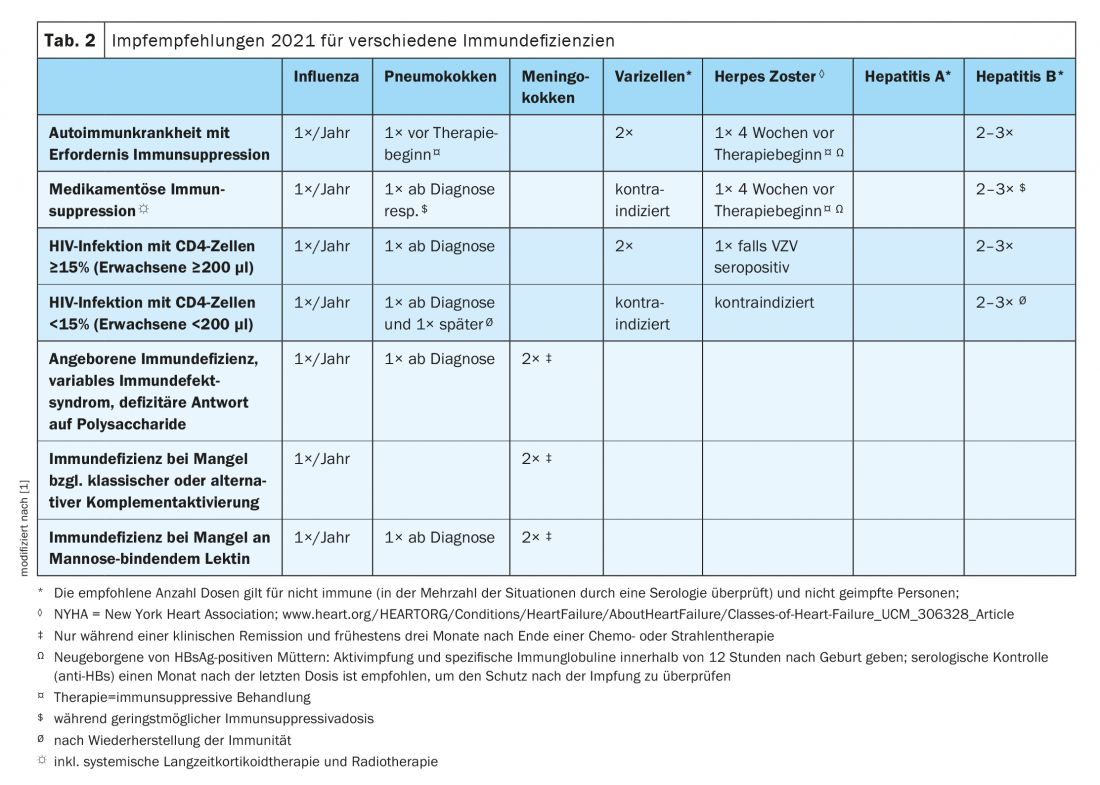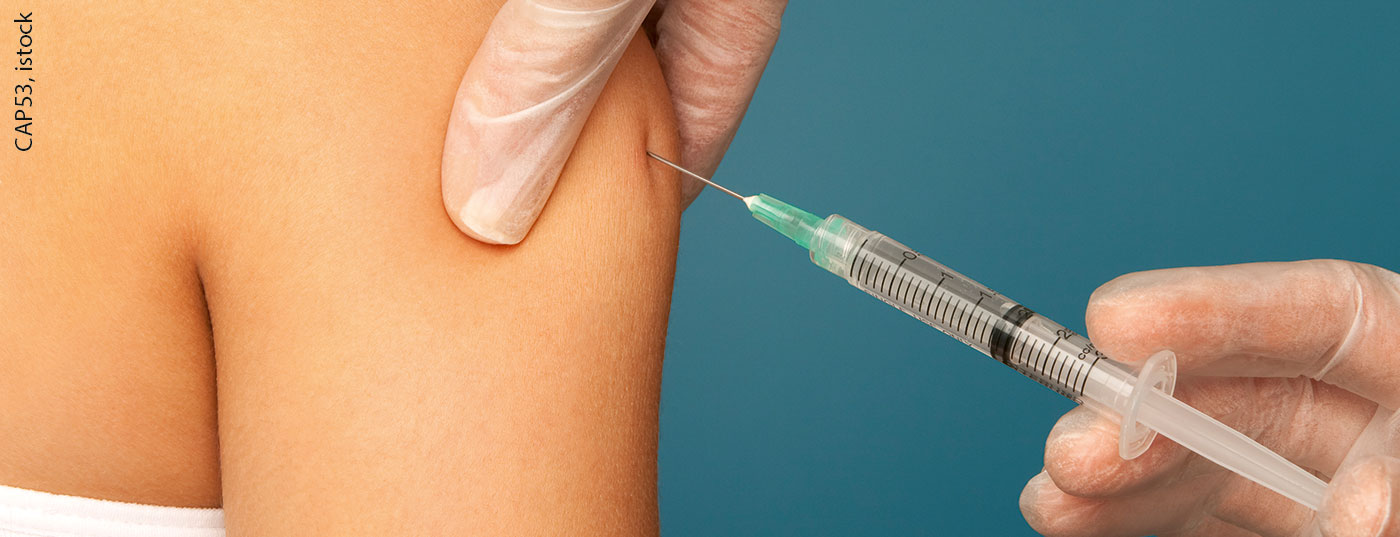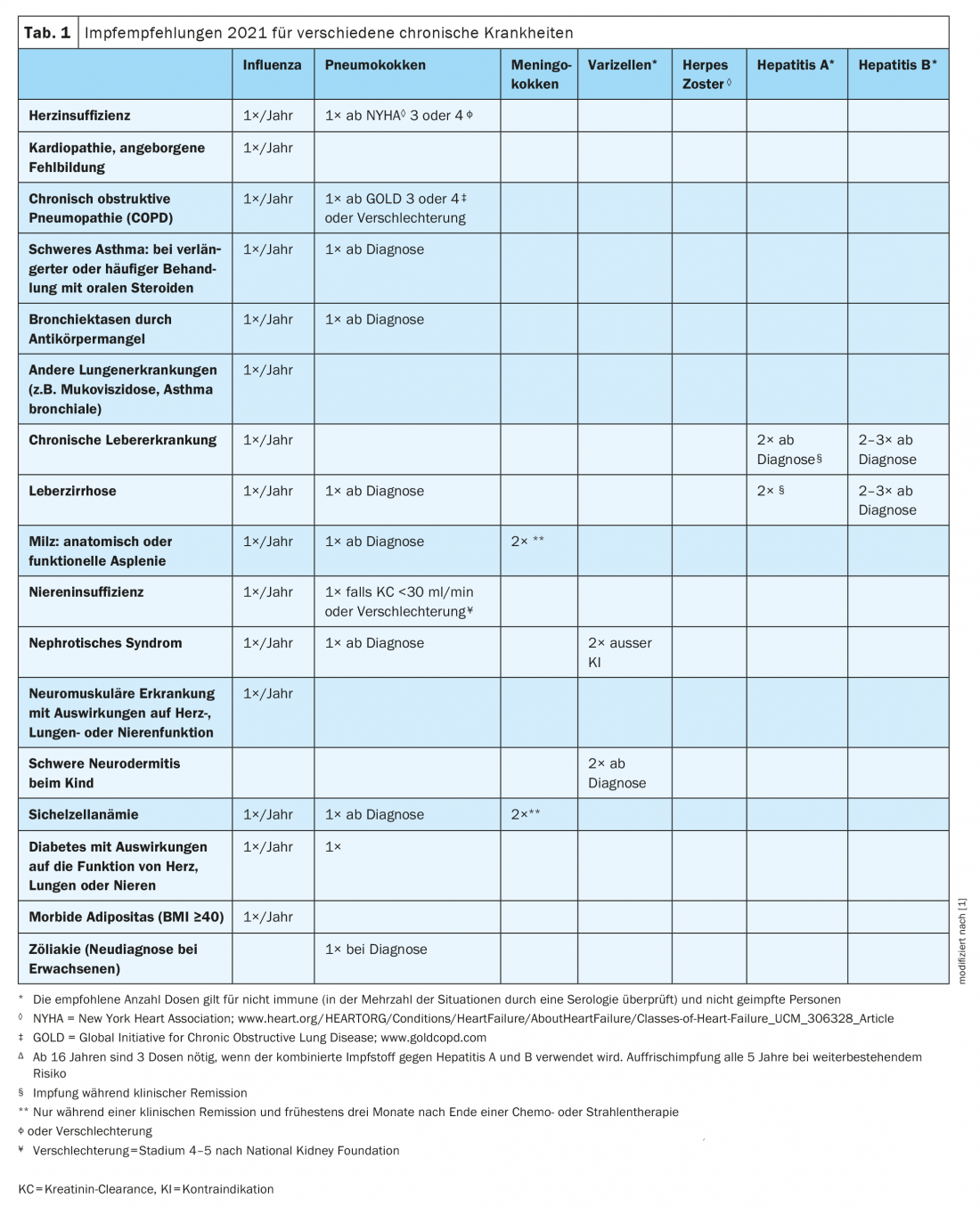Vaccinations for other vaccine-preventable infections should not be neglected during the corona pandemic. Various congenital, disease-acquired, and iatrogenically induced conditions are associated with immune system suppression and therefore require consideration of specific vaccination recommendations. This includes, on the one hand, the need for additional vaccinations to prevent complications from vaccine-preventable diseases and, on the other hand, foregoing live vaccinations when appropriate.
In the Swiss Vaccination Plan 2021, there is again a separate chapter for persons who have an increased risk of complications and invasive infections due to their health status [1]. The Swiss Information Platform for Vaccination Infovac (www.infovac.ch) has published a factsheet on this topic, and in the Swiss Vaccination Plan there is a separate chapter with vaccination recommendations for risk groups in addition to the basic and supplementary vaccinations. Information and recommendations related to corona vaccination are not part of the vaccination schedule, but are listed separately on the FOPH website.
Individual vaccination management
All recommended vaccinations of the Swiss Vaccination Plan 2021 (basic vaccinations, supplementary vaccinations, vaccinations for situations with an increased risk of exposure or transmission) should be considered for patients in the risk groups. The specific travel vaccines are not discussed here [2].
In general, caution should be exercised with regard to live vaccines in immunocompromised individuals due to the risk of infectious disease caused by the vaccine antigen. Inactivated vaccines, on the other hand, can be given without risk. Because immunodeficient health conditions may have weakened or absent vaccine responses, it is important to anticipate periods of intense immunosuppression (chronic inflammatory autoimmune diseases, oncologic treatment, transplantation) in order to vaccinate beforehand if possible or at the time during which immunosuppression is as low as possible. The Infovac factsheet draws attention to the following [2]: “The combination between chronic disease and its treatment often makes it difficult to assess vaccination success”. Therefore, serologic follow-up of titers may be useful to determine vaccine response. The level of vaccination titers can provide information about the duration of vaccination protection and is a basis for the indication of any additional or booster doses.
Notes on individual vaccinations
The schedules with the vaccination recommendations for risk groups of persons with certain chronic diseases recorded in the Swiss Vaccination Plan 2021 can be seen in Tables 1-2 [1]. Refer to the vaccination schedule for recommendations for premature infants, newborns, during pregnancy, with cochlear implant and after skull base fracture/misfracture (including cerebrospinal fluid fistula), neoplasia (lymphoma, leukemia, myeloma), and transplantation. The following supplementary information on the vaccinations listed in Tables 1-2 is based on a corresponding factsheet from Infovac [2]:
Influenza (inactivated seasonal influenza vaccine): Repeat vaccination annually between October and November (as long as health risk persists).
Pneumococcus (inactivated 13-valent conjugate vaccine; use is “off-label” in Switzerland from 5 years of age): Vaccination as early as possible after diagnosis or at the time defined in the vaccination schedule.
Meningococcal (inactivated quadrivalent conjugate vaccine against serogroups A, C, W, and Y; off-label use in children under 2 years of age): Number of vaccine doses and need for booster vaccinations according to age and continuing risk.
Varicella vaccination (live attenuated vaccine): Vaccination contraindicated out of caution in case of pregnancy and in infants ≤12 months. Vaccination contraindicated out of caution during treatment with immunosuppressants. If serology is negative, vaccination is recommended before immunosuppressants are used, or during remission in the case of cancer.
- Non-immune Persons 12 months of age and older: 2 doses at least 12 months apart. 4 weeks.

Herpes zoster (live attenuated vaccine): Contraindicated for patients who have recently or currently received immunosuppressive therapy, especially if different agents have been administered. Vaccination possible for patients on topical or inhaled corticosteroids, low-dose corticosteroids, or low-dose immunosuppressants, except methotrexate: methotrexate is a contraindication regardless of dosage.
- Recommended vaccination for a defined group of immunocompromised patients between 50 and 79 years of age in the near future, currently still without or with only “mild” immunodeficiency, in whom immunodeficiency is expected, for example due to planned immunosuppression: 1 single dose.
Hepatitis A (inactivated vaccine): Always consider the combination hepatitis A and B vaccine when indicated for vaccination against either disease.
Hepatitis B (inactivated vaccine): Timing of vaccination, number of doses and vaccine according to age and risk. Always consider the combination hepatitis A and B vaccine when indicated for vaccination against either disease. However, the costs are not covered by the compulsory health insurance.
All this information is taken into account by the “viavac” program. This is software designed to facilitate individualized immunization management, including determination of a specific person’s immunization status and calculation of patient-specific catch-up immunization schedules (www.viavac.ch).
Literature:
- BAG: Swiss Vaccination Plan 2021, www.infovac.ch/docs/public/-main/schweizerischer-impfplan-de.pdf, (last accessed 11.05.2021).
- Infovac: Recommended Immunizations for Persons at Increased Risk of Complications or Invasive Infections 2019, www.infovac.ch/de (last accessed May 11, 2021).
HAUSARZT PRAXIS 2021; 16(6): 13-15












